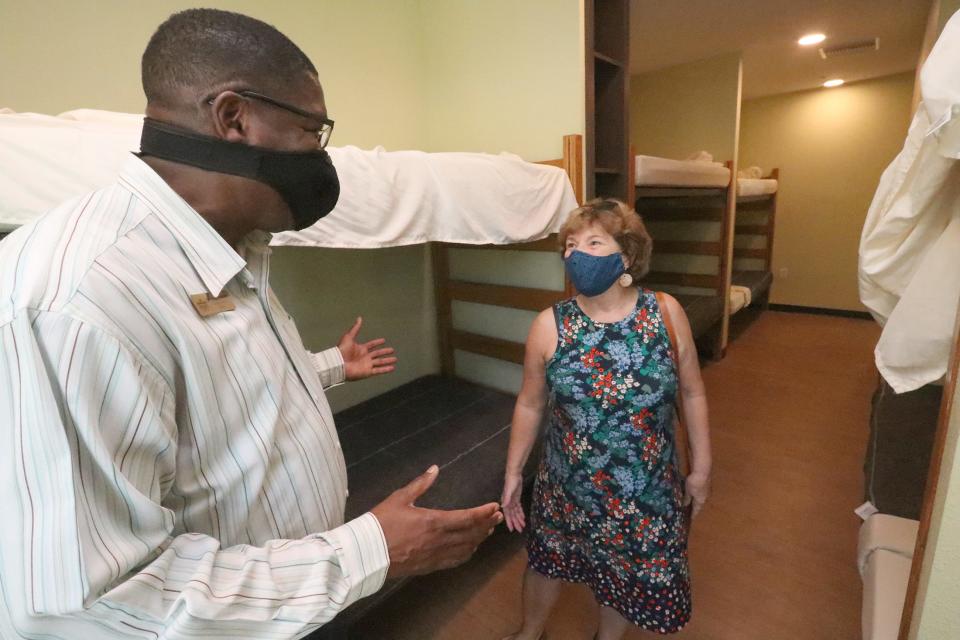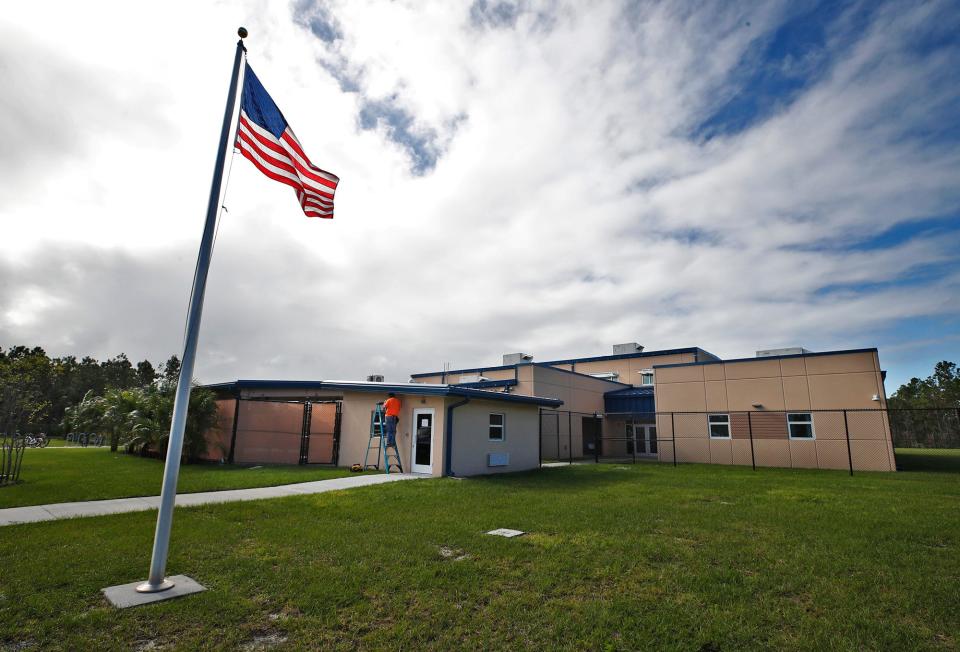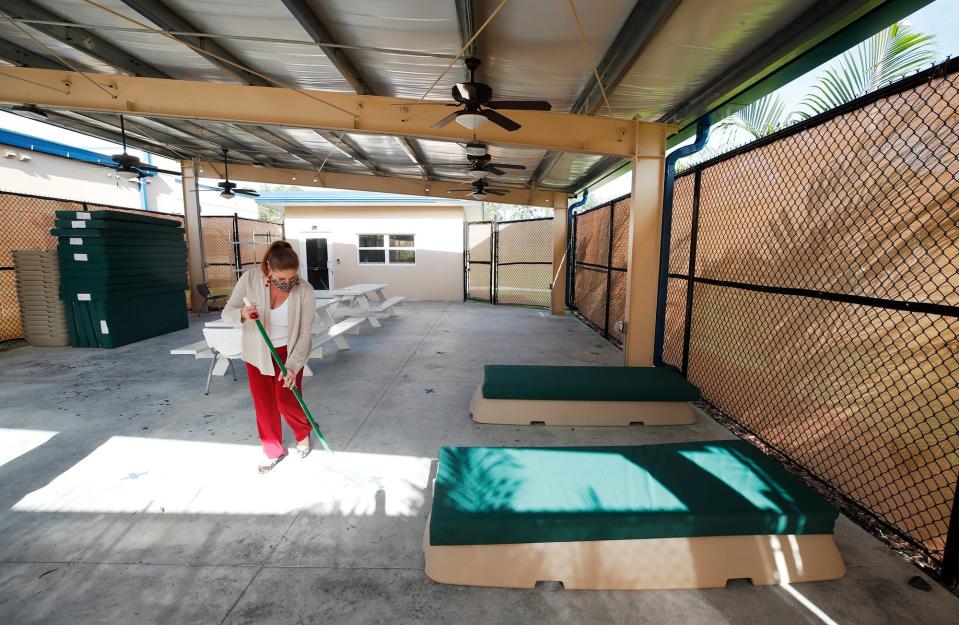DeLand homeless to face new, more stringent rules on use of public property
DELAND — Over the past several years, downtown DeLand has been experiencing what Daytona's Beach Street corridor has for decades.
A growing number of homeless people have been intimidating and harassing businesses' employees and customers, sleeping in public areas, and urinating or defecating on sidewalks in front of stores.
On Monday night, DeLand city commissioners passed four measures they hope will alleviate those problems and connect homeless people with help that could dramatically improve their lives.
The measures, all passed unanimously after lengthy discussion, will outlaw camping on public property, prohibit people from leaving their belongings on public property for more than 24 hours, and ban laying on public sidewalks, streets, alleys and benches.
The fourth measure will open Daytona Beach's First Step Shelter to the homeless in DeLand.

"This is a step, not a solution," said City Commissioner Kevin Reid.
"It's an important first step," said Mayor Chris Cloudman.
After eight years of other efforts that have failed to put a significant dent in DeLand's homeless problems, city commissioners agreed it was time to take more aggressive action.
City Attorney Darren Elkind said the new rules were drafted carefully, and they should pass legal muster. He did predict, though, that the city might have to make some adjustments to the new parameters over the next year or two as police officers apply the new local laws and suggest approaches that would be more effective.
Tackling the difficult homeless problem
The city has been more proactive about addressing homelessness in DeLand since 2016, when city and community leaders started developing a plan that led to the creation of The Bridge homeless shelter and day services center on South Palmetto Avenue.
The Bridge offers 30 beds, a communal dining area, showers, case management, mental health and drug abuse counseling, job assistance, medical care, haircuts, and laundry. The Bridge also helps people get into housing within 30 to 90 days.
DeLand has also prohibited panhandling at nine intersections, and is exploring a diversion from incarceration program to help people charged with misdemeanors get mental health assistance rather than a jail stay.
"Despite our best efforts, there continues to be homeless individuals that reside in downtown and other areas of DeLand that refuse to go to the Bridge or First Step where they can be helped," Elkind wrote in a recent memo. "The conditions under which they live on the streets is deplorable, and filled with violence fueled by substance use disorders and untreated mental illness."
He went on to write that "we need to stop allowing the camping and storage of belongings in public spaces and focus their attention toward residing in spaces that provide proper shelter and have the resources to help with substance use disorders, mental illness and other issues that prevent them from being housed."

The newly adopted ordinance explains that camping can include things as basic as sleeping outside on a piece of cardboard or in a sleeping bag.
Only if a person sleeping on public property refuses to leave and refuses to go to a shelter could they face criminal charges. But the measure can't be enforced if shelter space is not available.
Because homelessness itself can't be criminalized, when DeLand police officers tell people now they can't sleep on public property, they have to offer them the option of a shelter bed if the person doesn't have a different legal place they can move to. Adding First Step Shelter now as an option will help when beds at The Bridge are full.
First Step Shelter has 100 beds, and it also has an outdoor fenced "safe zone" where homeless people can stay overnight. Those in the safe zone can leave whenever they want and don't have to enroll in the formal First Step Shelter program.
Those who sleep inside the shelter on Daytona Beach's west side have to commit to working the program that aims to get them stabilized and in housing. First Step Shelter has housed more than 600 people with its comprehensive assistance program.
Being able to access First Step Shelter will cost DeLand $69,368 annually under the agreement commissioners approved Monday night at City Hall. The First Step Shelter Board, which meets at the beginning of next week, will need to approve the agreement with DeLand before it becomes effective and before DeLand police can start enforcing the new public property camping ban.
'30 days later I'm a success story'
One of the related local laws commissioners approved prohibits leaving personal belongings on public property for extended periods of time. That can include garbage bags stuffed full of clothes, and shopping carts overflowing with someone's personal items.
If police find what appear to be abandoned items, they'll leave a tag on them warning the owner they have 24 hours to move the belongings. If an officer finds the items still not moved after 24 hours, they'll take them to The Neighborhood Center of West Volusia, where the owner can retrieve them.

Another one of the new ordinances prohibits lying down on public sidewalks, alleys and other rights-of-way at any time on the ground or on a bench. It also includes a prohibition against a person sitting or lying down on public property in a way that blocks the use of it. But there are some exceptions, including people sitting on a sidewalk to watch a parade.
Daytona Beach resident Jim Cameron said he's had to clear away homeless encampments on his property at 840 W. New York Ave. in DeLand a dozen times.
"I want to thank you for being proactive on this issue," Cameron told commissioners.
Daytona homeless shelter celebrating: Helping those most in need: Daytona homeless shelter gala raises hundreds of thousands
Savannah-Jane Griffin, CEO of the Neighborhood Center of West Volusia, said she estimates there are about 400 homeless people in DeLand. The Neighborhood Center, among other things, manages The Bridge shelter.
The Neighborhood Center ensures about 200 people are housed per night at The Bridge and various transitional and permanent supportive housing sites, Griffin said. First Step Shelter can help fill some of the remaining gap, but more affordable housing is needed, she said.
A 63-year-old woman told city commissioners The Bridge turned her life around. She said she had been homeless in DeLand for nine months when she went to The Bridge on Jan. 9.
Now she's in housing.
"I was accepted into their program, and 30 days later I'm a success story," she said. "I'm just very thankful and grateful for what they've done for me."
You can reach Eileen at Eileen.Zaffiro@news-jrnl.com
This article originally appeared on The Daytona Beach News-Journal: DeLand City Commission passes new homeless rules

